- Home
- Archive -Oct 2010
- You can make a . . .

You can make a difference
- In :
- Personal Growth
October 2010
By Jamuna Rangachari
Efforts, big and small, make a difference to our own lives and sometimes to those of others
Priya George, the wife of a naval officer, was in Delhi during the infamous Sikh pogroms, after Indira Gandhi’s death. Deeply concerned, she longed to offer her services to an NGO and help the traumatised victims. Nothing materialised. After much thought, she decided to visit a gurudwara. Some Sikh children were staying there because of the situation outside. Slowly, she won over their trust during a time when Sikh alienation with the rest of India was at its peak. “Priya, just having you with us makes us feel so much better,” said Diljeet, a mother. Even today, the friends she made during this charged period are among those who have stayed closest to her heart, Priya admits.
Mohammed Dilawar, a nature lover, wondered why only tiger protection was being highlighted, and never the humble sparrow. Sparrows, according to him, are nature’s bio-indicators. “They have lived in tandem with human beings for thousands of centuries. Like squirrels, mynahs, tailorbirds, and sunbirds, you don’t find them in the jungles. If there is a significant shift in their population, it is an alarm signal for us,” he reflected. When he saw a sparrow building a nest in the switch box of a telephone pole, he decided to help the little winged creature immediately. After experimenting at home, he started manufacturing and selling wooden nesting boxes, costing just Rs 250. “It’s heartening to hear from
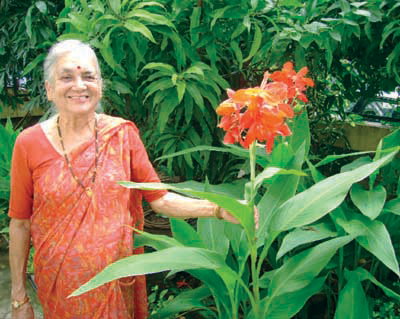 Sudha Pai:Creating gardens out of waste Sudha Pai:Creating gardens out of waste |
families that their children are thrilled to watch chicks hopping about, being fed by the mother,” he says.
Sudha Pai was born and brought up in the beautiful state of Kerala. Marriage to someone in the defence services took her to the National Defence Academy (NDA) in Pune, where they were provided with spacious accommodation and a large garden. When her husband retired, and they moved to Magarpetta in Pune, she was appalled at the accumulation and indifferentdisposal of garbage. Instead of just protesting, she decided to find ways and means to deal with her own household waste, by using different methods. Now, she has made it a mission to tell others how one can deal with this issue in a better way, and has made h er home a wonderful green haven.
Acceptance
The first step to mastery really lies in acceptance of circumstances, of one’s own self, or one’s life. People abroad often tell me how terrible it must be to live in such an over-populated country like India. However, when I see the comfort and friendliness of people around me, and their helpfulness, and smiles, the population explosion seems only to have showered me with blessings. The fact that we have so many varied communities is an added bonus for it enables me to understand different cultures, practices, traditions and religions, and to live with and respect differences.
Being married to a naval officer, moving frequently is yet another blessing, giving opportunities to know and interact with more people, although it was hard initially to make my daughter, Samyukta, see the bright side of things. When she grumbled about being uprooted frequently, I suggested to her that perhaps we were being given a God-given opportunity to change. Soon, she learned to interact with different kinds of people, acquire new skills, and discovered the value of having such a varied basket of experiences to draw from. Today, she loves all the places we have lived in, and recounts incidents related to each with relish.
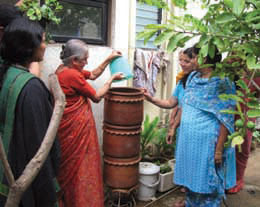 Sudha passing on her knowledge to willing learners Sudha passing on her knowledge to willing learners |
When acceptance dawned on her, I told her of my own initiation in the hands of a senior officer who told me just after marriage, “Don’t fight the transfers or stay apart, when you as a couple, can stay together. Remember there is always enough to do, especially in India.” His wife, a qualified doctor, had in fact, done just that, helping and assisting wherever and whenever she could, without craving for a bigger designation in a hospital. “The hospitals will get doctors, but I find it wonderful that I am able to help those who don’t get good help,” she says.
Changing one’s milieu is the lot of people other than those with a transferable job. When Chella Venkatraman shifted to Mumbai when her husband got transferred to the city, she desperately missed the music concerts of her native Chennai. A friend cajoled her to come to a nearby class teaching Marathi songs. She went ahead and enrolled and learned both the music and the language. Today, she is elated that she has learnt abhangs. She now impresses both people in Mumbai and Chennai with her rendition.
Arti Datta, a qualified doctor, moved to the US with her husband. She realised she had to write several exams, and commute a lot, to continue her practice of surgery. A mother of two girls, she decided to pursue an alternative path, that of dance, which she had learnt in India. She had to relearn some of the dance steps, but did that diligently, and is now well-known in the US as a Bharata Natyam teacher. She is sure that the two years she spent relearning, have made her more energetic and revived her passion in dance. “It is wonderful that I have been able to teach my girls, and bond with them,” she says with a smile.
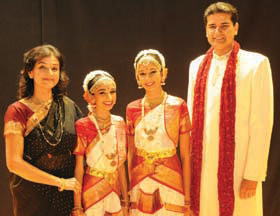 Arti Datta with her daughters and husband after a dance recital Arti Datta with her daughters and husband after a dance recital |
Eric Small was diagnosed with relapsing-remitting multiple sclerosis (MS) when he was just 22. After trying various therapies, he learnt yoga from renowned guru BKS Iyengar. He also published a book on yoga for people with multiple sclerosis. “Regardless of what MS symptoms may arise, the asanas can be adapted for continued practice. You do not have to wrap your legs behind your ears or stand on your head. Anyone can do yoga – even sitting in a wheelchair or lying in bed,” he says, adding, “Yoga is invaluable for people with MS.” Eric Small’s book inspired me to attempt yoga again, as I also suffer from MS.
When acceptance sets in, there is room for growth in various situations. While some crib continuously and yearn for the impossible, others assess the situation and work around it, much like Priya, Mohammed, Sudha, Chella, Arti, and Eric. None of them really thought of making a difference when they started out but they did, to themselves and others.
Self-acceptance
“When you root yourself in unchangeable ‘true north’ principles, you may still measure the various metrics of your life, and notice how they change over time, but you will not make them part of your identity. Hence, you keep your self-esteem separate from your particular circumstances,” said Stephen Covey on self-acceptance.
The same is true with life. People who went on to become role models, made a beginning only after self-acceptance, be it Helen Keller, Mahatma Gandhi or Eric Small.
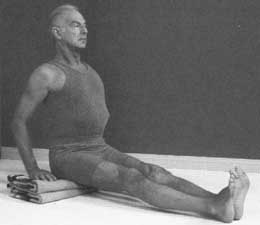 |
Prioritise
Faced with multiple choices, sometimes one needs to pick the one that suits our particular circumstance the best. Priya did not join an NGO as it would have meant commuting long distances, and neglecting domestic responsibilities. Sudha Pai did not join any group working on afforestation to do her bit, as she too did not wish to spend too much time outside home. Mohammed merely wished to make a difference to his surroundings, and to the birds, and made a small beginning.
Introspection of various aspects helps us to make focussed choices. Often, this requires time, because it involves understanding what may suit you, and what may not.
Effort
When Chella had to learn abhangs, she found the language and accent difficult to master. “I struggled hard for a while, but with my teacher’s assistance, and practising hard, I overcame it.” Samyukta took time and effort to settle into each new school. She also knows how to pack and unpack, prioritise the important issues, and discard the rest. Arti re-learnt dance with great effort, to adjust to her new circumstances. It paid dividends not just in dance, but also in her relationship with her family.
Eric Small went all over the US looking for yoga classes, and later taught it to many people with disabilities. He says in an interview, “Let us remember that there are no plaques on our spirits, even if we have been diagnosed with plaques in the brain.” Helen Keller worked hard to speak and understand. Mahatma Gandhi struggled hard to spread the message of satyagraha. Truly, effort always pays dividends, in all areas of life.
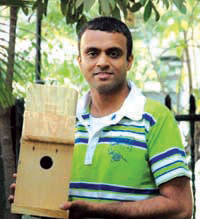 Mohammed Dilawar and his bird box Mohammed Dilawar and his bird box |
Ego
Ego can be a big hindrance in anything that one does. When I was asked why I was not able to do basic asanas, I refused to be disheartened. Even when people suggest various exercises, I only connect to the intent, not to whether it would be possible for me. As a result, I only feel grateful for the suggestions given to me, while attempting only what I can. When Mohammed was asked why he focused on the birds when so many wild animals needed more attention, he replied, “I only want to reproduce what I had seen in my childhood. I know all of us need to do our bit.”
Not all people who make an impact start off by intending to be a great success. They do it by assessing what is possible and meaningful to them, at that time. Would yoga have been as well known, without the steps taken by the numerous practitioners earlier?
In sum
One of the biggest obstacles is the question people ask themselves, when they think about what they would like to do, “Where do I start?” Then they assess whether it is possible, and what hindrances could come in their way. Many a time, dreams are put aside for later, only to remain unfulfilled.
When we make a beginning by taking that first step, Providence shows us the way to the next.
It is that first step, however small, which is important. The rest will follow.
To know more about the people mentioned, see
Mohammed Dilawar – http://www.natureforever.org/
Sudha Pai – http://garbagetogardens.blogspot.com
Eric Small http://www.yogams.com/
To read more such articles on personal growth, inspirations and positivity, subscribe to our digital magazine at subscribe here
Life Positive follows a stringent review publishing mechanism. Every review received undergoes -
- 1. A mobile number and email ID verification check
- 2. Analysis by our seeker happiness team to double check for authenticity
- 3. Cross-checking, if required, by speaking to the seeker posting the review
Only after we're satisfied about the authenticity of a review is it allowed to go live on our website
Our award winning customer care team is available from 9 a.m to 9 p.m everyday
The Life Positive seal of trust implies:-
-
Standards guarantee:
All our healers and therapists undergo training and/or certification from authorized bodies before becoming professionals. They have a minimum professional experience of one year
-
Genuineness guarantee:
All our healers and therapists are genuinely passionate about doing service. They do their very best to help seekers (patients) live better lives.
-
Payment security:
All payments made to our healers are secure up to the point wherein if any session is paid for, it will be honoured dutifully and delivered promptly
-
Anonymity guarantee:
Every seekers (patients) details will always remain 100% confidential and will never be disclosed

Accept
The first step in doing anything that we may wish to do is always acceptance of ourselves, and the circumstances in which we find ourselves.
Prioritise
One can spend a few minutes in thinking about what our priorities are.
Do not compete or ponder on what might have been.
Despair and self-pity can be crippling. Never fall prey to either of these.
Discard ego
Ego can make you a prisoner of your own self. It would help if we ask, “Is this necessary for what I wish to do,” whenever we face a difficult situation, instead of asking, “Why was I not given importance or was it not my idea?”
Remember, even a little effort makes a difference to our lives. We can make life meaningful to us, and we can do it anytime.